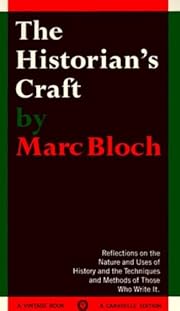

Click on a thumbnail to go to Google Books.
|
Loading... The Historian's Craft: Reflections on the Nature and Uses of History and the Techniques and Methods of Those Who Write It. (original 1949; edition 1964)by Marc Bloch (Author)
Work InformationThe Historian's Craft by Marc Bloch (Author) (1949)

No current Talk conversations about this book.  The work we have here is a translation of a French work on the methods & practice of history written by Mr. Bloch. Unfinished at the time of his murder at the hands of the Nazis, it remains an interesting look of a French historian's view of history & how history should be approached. His reflections consists of five chapters with the fifth remaining unfinished (completed by another historian). He covers a wide range of how history was written earlier to the present day (up to the 1940s). He points out that much of the earlier history fell far short of accuracy or driven by the need to either cover up or embellish, creating difficulties for successive historians of getting to what really happened. He suggests that historians must observe, have a critical eye, & analyze what is before them. For example, primary documents are considered to be essential yet they are to be regarded with caution depending on what possible motives the authors have in writing them. There is much more & it is sad that the author's life was cut short as he had so much more to say but we shall never know. L'ho letto, l'ho riletto, l'ho criticato, l'ho rivoltato come un calzino (notare l'usura della copertina scannerizzata). Non si allontana mai dalla mia vista. E' come un vecchio nonno saggio che, con grande semplicità, al bisogno, mi ricorda il rigore di un mestiere difficile. Ma non è un testo per addetti ai lavori. E' per chi ama interrogarsi sullo scorrere del tempo e sul posto che ciascuno di noi vi occupa. E' una delle migliori illustrazioni che io conosca di ciò che afferma anche il mitico Francesco: "la storia siamo NOI, nessuno si senta escluso". no reviews | add a review
Belongs to Publisher SeriesIs contained in
This work, by the co-founder of the "Annales School" deals with the uses and methods of history. It is useful for students of history, teachers of historiography and all those interested in the writings of the Annales school. No library descriptions found.
|
Current DiscussionsNonePopular covers
 Google Books — Loading... Google Books — Loading...GenresMelvil Decimal System (DDC)907History & geography History Education, research, related topics of historyLC ClassificationRatingAverage: (4.13) (4.13)
Is this you?Become a LibraryThing Author. |
||||||||||||||||||||||||||||||||||||||||||||||||||||||||||||||||||||||||||||||||||||||||||||||||||||||||||||||||||||||||||||||||||||||||||||||